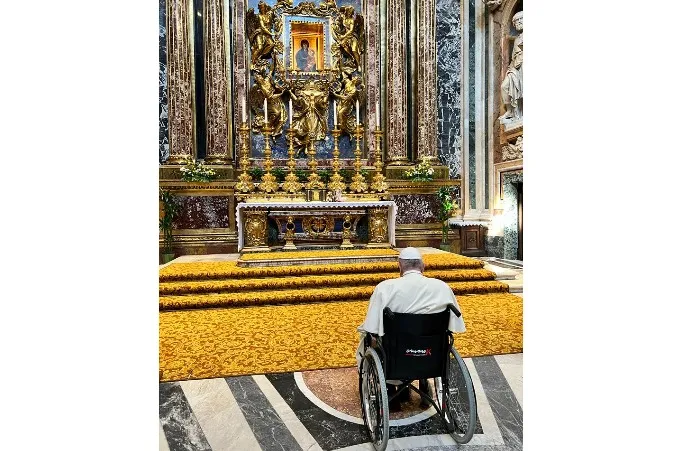
Rome, Italy, Jul 22, 2022 / 11:45 am (CNA).
Pope Francis visited a Roman basilica on Friday to ask for the Virgin Mary’s intercession and protection ahead of his week-long trip to Canada.
The pope prayed in front of the Marian icon of Salus Populi Romani in Santa Maria Maggiore on the morning of July 22.
A photo released by the Vatican showed the pope seated in a wheelchair below the icon of Mary, Protection of the Roman People, which has been revered in the Eternal City for centuries.
The Holy See press office said that the pope went to the basilica to entrust the Virgin Mary with his upcoming trip to Canada.
The pope is scheduled to travel to the Canadian cities of Edmonton, Quebec City, and Iqaluit from July 24-29. There he will meet members of Canadian indigenous groups, residential school abuse survivors, and Catholics.
Pope Francis is expected to issue an apology in Canada on behalf of the Catholic Church for the abuses committed against indigenous students in Catholic-run residential schools.
The pope met with representatives of the Métis, Inuit, and First Nations peoples at the Vatican at the end of March and beginning of April and expressed sorrow for the harm they have suffered.
He has said that his trip to Canada will be a “penitential pilgrimage” to bring healing and reconciliation.
Pope Francis will also visit the Cathedral-Basilica of Notre-Dame de Québec on July 28. The minor basilica, founded and dedicated to the Virgin Mary in 1647, was the first parochial church in Canada.
It has been Pope Francis’ custom to visit the icon before his international trips to ask for the Virgin Mary’s protection. He also typically visits the icon upon returning to Rome and before re-entering the Vatican.
If you value the news and views Catholic World Report provides, please consider donating to support our efforts. Your contribution will help us continue to make CWR available to all readers worldwide for free, without a subscription. Thank you for your generosity!
Click here for more information on donating to CWR. Click here to sign up for our newsletter.




Leave a Reply